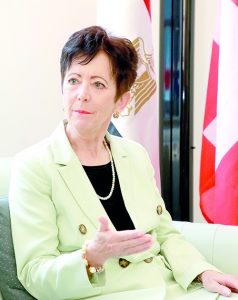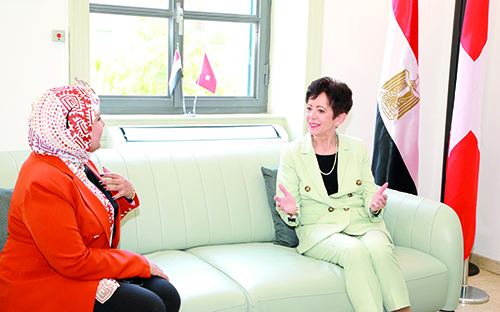The opening of the Swiss Embassy in Cairo in 1957 was one of many milestones marking a fruitful and prosperous relationship between the two countries and peoples. Trade and investment relations go as far back as the 19th century when many Swiss entrepreneurs and merchants were engaged in the cotton and other businesses.
In an interview with The Egyptian Gazette, Swiss Ambassador to Cairo Yvonne Baumann gave an insight in how this relationship has grown as both countries have strong political, economic and cultural ties as well as a broad co-operation programme with Egypt, entailing projects from water and waste management to supporting small and medium enterprises and women entrepreneurs.
“Egypt is part of our neighbourhood and a favourite destination for many Swiss tourists, further enhancing the ties between our countries,” she said.
The Swiss envoy added that Egypt is heavily affected by the Russian war in Ukraine and by the war in Sudan. “We continue to support Egypt in tackling these crises and accommodating refugees and migrants. Switzerland has provided Egypt with more than $165 million in grants for co-operation projects since 2011,” the ambassador said.
“Egypt is an important country and plays a significant role in topics of mutual interest, such as peace and security, migration, and climate change,” she added.
Promising areas for collaboration
Around one million young Egyptians enter the job market every year. Through
The joint co-operation programme, both sides promote the creation of jobs by supporting the development of the private sector, particularly small and medium-sized enterprises, which are the backbone of the economy.
There is also a high demand for better training and preparation. A relatively new and promising area of joint co-operation is therefore Technical and Vocational Education and Training (TVET).
Switzerland supports the technical education reform by the Egyptian government by supplying expertise, in promoting the apprenticeship model as well as improving curricula and quality of teaching.
“We focus on TVET for youth, women, and migrants in collaboration with Swiss companies and other actors in the private sector,” the ambassador said.
In view of climate-related challenges, “green skills” are particularly relevant. Over 30 per cent of Switzerland’s co-operation budget is allocated to the shift towards a more climate-friendly economy.
“We transfer knowledge to develop skills relevant to sectors such as sustainable energy, clean production, and recycling,” the envoy added.
Another promising area is scientific collaboration. Switzerland is known for fostering innovation, and researchers at Swiss universities work together with their peers around the world on a broad array of subjects including Egyptology.
Finally, there is much potential for expanding trade and investment relations due to Egypt’s large domestic market and its position as a gateway to Africa.
Remarkable progress in economic collaboration
Egypt continues to be Switzerland’s top export destination in Africa. The total trade volume amounted to $1.5billion in 2022.Chemicals and pharmaceutical products were the biggest part of our total exports last year.
Textile products make up 40 per cent of Egyptian exports to Switzerland.
“Last October, we celebrated the delivery of the first batch of Swiss textile machinery. The €260 million deal is an example of successful collaboration to invest in the modernisation of this historic industry and the promotion of Egyptian exports,” Baumann said.
For years, Switzerland has been among the ten biggest sources of foreign direct investment in Egypt. In the fiscal year 2021-2022, Swiss investment ranked in seventh place with FDI capital inflows of $649 million. Almost 100 Swiss companies operate in Egypt. Swiss investments remain diversified and there is room for growth, particularly in food, agriculture, pharmaceuticals, infrastructure and clean tech. We welcome the new State Ownership Policy that promotes private sector participation in the economy and should attract further foreign investment.

Expected official visits
Swiss State Secretary for Economic Affairs Helene Budliger Artieda is expected to visit Egypt in September. Artieda made it a priority to visit Egypt early in her tenure. Her visit is inscribed in Switzerland’s foreign economic strategy, which seeks to diversify its trade partners and reach new markets. Egypt offers unique opportunities in this regard. Besides meeting with government officials and private sector representatives, the State Secretary will attend the annual conference of the Asian Infrastructure Investment Bank in Sharm el-Sheikh. A Swiss business delegation is planning to attend the Intra-African Trade Fair (IATF) in Cairo in November.
In a related context, the Swiss envoy said business councils are important for fostering cross-cultural links and capitalising on business and investment opportunities. They offer a platform for companies to meet and to advocate for improved framework conditions for investments.
“Luckily, we already have Swiss Cham, a well-run non-profit organisation that promotes Swiss-Egyptian economic ties. Its membership consists of Swiss and Egyptian businesses across different industries,” Baumann said.
Preserving cultural heritage
Switzerland and Egypt share the common goal of preserving cultural heritage and fighting against its illicit trade. The ambassador pointed out that Switzerland values its cooperation with Egypt that resulted in the successful return of roughly 70 objects since 2011. Just last month, Switzerland returned a fragment of a statue of Ramses II to the Egyptian Ambassador in Switzerland.
Climate commitments
Ahead of COP27, Switzerland together with the United Nations Development Programme, the European Union, Denmark, and the African Climate Foundation signed a USD 6.2 million agreement to support Egypt as the host country and president of COP27, as well as the efforts to make Sharm El-Sheikh a green city. “We continue to support the Egyptian COP presidency.”
The COP27 outcome on loss and damage was historic. Switzerland is actively engaged in the discussions on how to operationalise the new fund. It also remains committed to supporting developing countries in addressing the impacts of climate change. It already supports many funds and projects that contribute to averting, minimising and addressing loss and damage, she added.
Human rights
The Swiss envoy stressed that the National Strategy is an important milestone in Egypt’s journey towards enhancing human rights and fundamental freedoms. It addresses a number of significant issues, such as pre-trial detention, the death penalty, and freedom of expression. We look forward to its implementation in its second year.
“Switzerland partners with the National Council on Human Rights to facilitate a dialogue with different stakeholders such as youth, civil society, and media on the provisions of the National Strategy,” the envoy said.
As for the Decent Life Initiative, it is very timely in light of the current socioeconomic situation in Egypt, particularly with regard to addressing those communities that are most in need.






Discussion about this post